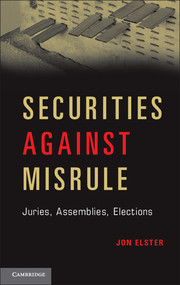Book contents
- Frontmatter
- Contents
- Preface and Acknowledgments
- Introduction
- 1 The Normative Study of Collective Decision Making
- 2 Ignorance, Secrecy, and Publicity in Jury Decision Making
- 3 A Dialogue with Bentham
- 4 The Optimal Design of Constituent Assemblies
- 5 Cross-Voting: A Study in Failure
- Conclusion
- References
- Index
- References
4 - The Optimal Design of Constituent Assemblies
Published online by Cambridge University Press: 05 March 2013
- Frontmatter
- Contents
- Preface and Acknowledgments
- Introduction
- 1 The Normative Study of Collective Decision Making
- 2 Ignorance, Secrecy, and Publicity in Jury Decision Making
- 3 A Dialogue with Bentham
- 4 The Optimal Design of Constituent Assemblies
- 5 Cross-Voting: A Study in Failure
- Conclusion
- References
- Index
- References
Summary
INTRODUCTION
Bentham did not see the need for a constituent assembly to produce a document that would constrain the legislature. He thought Parliament should be omnipotent, as the English Parliament was already at his time (the last time the Monarch had refused to sign a bill was in 1707) and as the House of Commons would become in 1911. There are, however, strong arguments for placing constitutional constraints on the legislature. In the previous chapter I cited Paine’s observation that only a written constitution could have prevented the Parliament from adopting the Septennial Act. Earlier, the lack of any such document had enabled the Long Parliament to maintain itself in existence for two decades.
We must ask, however, why a written constitution would have prevented Parliament from extending its tenure indefinitely. In a speech justifying what is arguably the first written constitution in the modern sense of the term, the 1653 Instrument of Government, Cromwell argued that a “single person,” such as the Lord Protector (himself), was needed. His argument (with Carlyle’s editorial comments in parentheses) identifies with precision the need both for a constitution and for a mechanism to enforce it:
It is true, as there are some things in the Establishment which are fundamental, so there are others which are not, but are circumstantial. Of these no question but I shall easily agree to vary, to leave out, “according” as I shall be convinced by reason. But some things are Fundamentals! About which I shall deal plainly with you; These may not be parted with; but will, I trust, be delivered over to posterity, as the fruits of our blood and travail. The Government by a Single Person and a Parliament is a Fundamental! It is the esse, it is constitutive. In every Government there must be Somewhat Fundamental, Somewhat like a Magna Charta, which should be standing, be unalterable. . . . That Parliaments should not make themselves perpetual is a Fundamental. [Yea; all know it: taught by the example of the Rump!] Of what assurance is a Law to prevent so great an evil, if it lie in the same Legislature to unlaw it again? [Must have a single Person to check your Parliament.] Is such a law like to be lasting? It will be a rope of sand; will give it no security; for the same men may unbuild what they have built.
- Type
- Chapter
- Information
- Securities against MisruleJuries, Assemblies, Elections, pp. 191 - 235Publisher: Cambridge University PressPrint publication year: 2013
References
- 1
- Cited by



